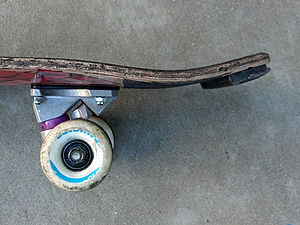Kicktail: Difference between revisions
Jump to navigation
Jump to search

m (Text replacement - "Freestyle Skateboard Anatomy" to "Skateboard Anatomy") |
mNo edit summary |
||
| Line 1: | Line 1: | ||
[[File:Kicktail.jpg|thumb|none|300px|The kicktail on a Decomposed Marco Sassi Koi Deck]] | [[File:Kicktail.jpg|thumb|none|300px|The kicktail on a [[Decomposed Marco Sassi Koi Deck]] ]] | ||
A '''kicktail''' is where the skateboard deck bends upward behind the [[Tail]] or [[Nose]]. The '''kicktail''' acts as a lever and is vital for manoeuvrability. Freestyle decks typically have two styles of '''kicktail''', [[Single Kick]] and [[Double Kick]]. In the early days of skateboarding, the '''kicktail''' was only at the tail end, but now [[Double Kick]] decks (with a kicktail on the nose and tail) are far more common. | A '''kicktail''' is where the skateboard deck bends upward behind the [[Tail]] or [[Nose]]. The '''kicktail''' acts as a lever and is vital for manoeuvrability. Freestyle decks typically have two styles of '''kicktail''', [[Single Kick]] and [[Double Kick]]. In the early days of skateboarding, the '''kicktail''' was only at the tail end, but now [[Double Kick]] decks (with a kicktail on the nose and tail) are far more common. | ||
Revision as of 18:32, 8 December 2016

The kicktail on a Decomposed Marco Sassi Koi Deck
A kicktail is where the skateboard deck bends upward behind the Tail or Nose. The kicktail acts as a lever and is vital for manoeuvrability. Freestyle decks typically have two styles of kicktail, Single Kick and Double Kick. In the early days of skateboarding, the kicktail was only at the tail end, but now Double Kick decks (with a kicktail on the nose and tail) are far more common.
You can browse Double Kick or Single Kick Freestyle Decks below: